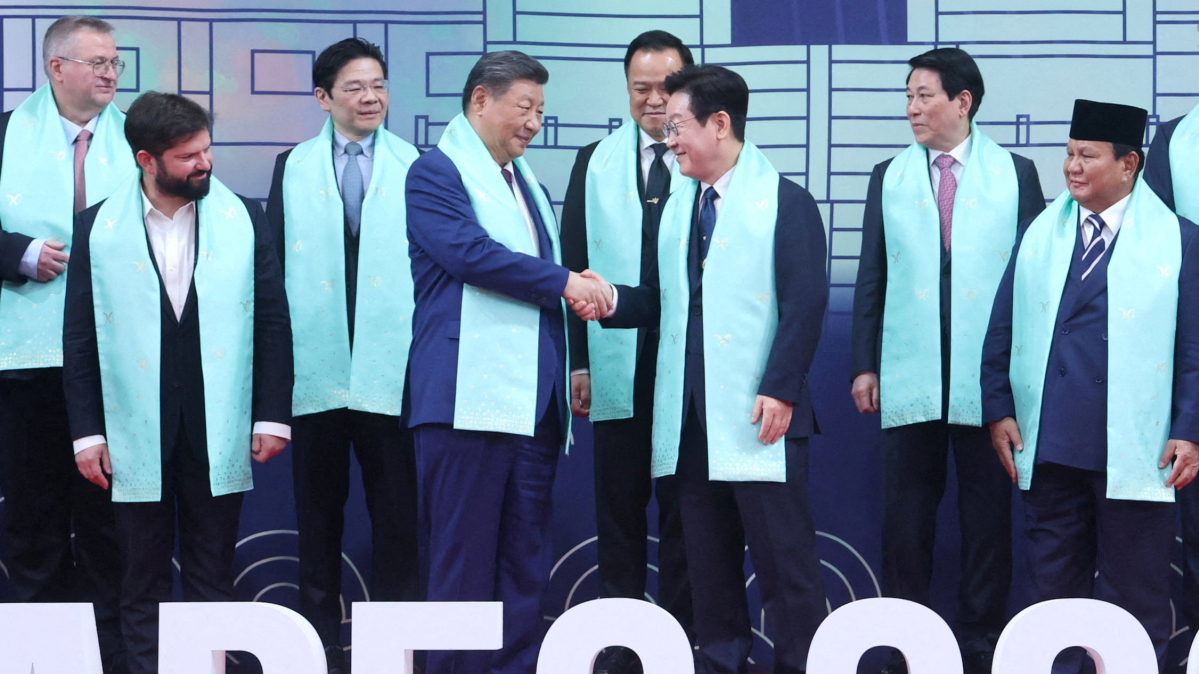Storm Kristin kills at least five in Portugal before moving to Spain
Storm Kristin has killed at least five people and left more than 850,000 residents of central and northern Portugal without electricity on Wednesday (...

Amid rising geopolitical tensions and growing uncertainty in the global trade system, Asia-Pacific leaders concluded the annual APEC summit on Saturday with a joint declaration emphasizing resilience and shared benefits in trade.
The gathering, hosted by South Korea, highlighted the deepening fractures in multilateral trade frameworks, driven by tariffs, export controls, and strategic economic competition.
U.S. President Donald Trump announced multiple trade deals with countries including China and South Korea ahead of the summit but left before it began. Analysts noted that the joint declaration conspicuously omitted references to multilateralism or the World Trade Organization, a departure from previous years’ documents.
"This reflects a recognition among member countries that restoring a free trade order based solely on multilateralism and the WTO is increasingly difficult," said Heo Yoon, professor of international trade at Sogang University in Seoul. "We are witnessing a paradigm shift in the global trade order."
China, taking advantage of Trump’s early departure, positioned itself as a steady advocate for free and open trade, a role historically dominated by the U.S. President Xi Jinping announced that China will host APEC in Shenzhen in 2026 and proposed the creation of a World Artificial Intelligence Cooperation Organization, signaling Beijing’s broader ambitions in technology and economic governance.
The summit highlighted South Korea’s delicate balancing act under newly elected President Lee Jae Myung, who assumed office in June. Lee has faced the twin challenges of protecting South Korea’s export-driven economy while managing regional security amid growing U.S.-China competition.
Lee hosted both Trump and Xi during the week. In separate meetings, he secured a surprise trade deal with the U.S. aimed at reducing tariffs in exchange for South Korean investment in American projects. On Saturday, Lee hosted Xi for a summit and state dinner — Xi’s first visit to South Korea in 11 years — where discussions reportedly included North Korea’s denuclearization, although Chinese media did not publicly acknowledge these talks.
North Korea responded with skepticism, calling denuclearization efforts a “pipe dream,” while Trump had offered to meet North Korean leader Kim Jong Un during his South Korea visit — an offer Pyongyang did not publicly address.
On the sidelines of APEC, Taiwan’s representative, Lin Hsin-i, met with U.S. Treasury Secretary Scott Bessent to discuss supply chains and semiconductors, reflecting the growing emphasis on technology in regional economic strategy.
The summit’s outcomes suggest a shift in the global trade paradigm, with member nations cautiously navigating between the retreat of U.S. influence under Trump and China’s proactive engagement. While few countries envision a trade order excluding the U.S., the APEC declaration indicates a shared interest in resilience, cooperation, and stability amid ongoing uncertainty.
The S&P 500 edged to a record closing high on Tuesday, marking its fifth consecutive day of gains, as strong advances in technology stocks offset a sharp selloff in healthcare shares and a mixed batch of corporate earnings.
Sanctions are a long-used tool designed as an alternative to military force and with the objective of changing governments’ behaviour, but they also end up hurting civilian citizens.
Residents in Syria’s Kurdish-majority city of Qamishli have stepped up volunteer patrols amid growing pressure from the country’s Islamist-led government, expressing deep mistrust of Damascus despite a fragile U.S.-backed ceasefire.
High-level diplomatic consultations were held in Istanbul, Türkiye, on Monday as Ankara seeks to solidify the fragile progress of the Gaza ceasefire and accelerate the delivery of life-saving assistance to the strip.
Iraq's former Prime Minister Nouri Al-Maliki said on Wednesday that he rejects U.S. interference in Iraq's internal affairs, after U.S. President Donald Trump threatened to cut off support to the country if Maliki was picked as prime minister.
Prime Minister Sanae Takaichi's Liberal Democratic Party is likely to increase its number of parliamentary seats and gain a majority in the lower house, a preliminary survey by the Nikkei newspaper showed on Thursday (29 January).
Start your day informed with AnewZ Morning Brief: here are the top news stories for the 29th of January, covering the latest developments you need to know.
UK Prime Minister Keir Starmer met Chinese President Xi Jinping in Beijing on Thursday (29 January) for talks he hopes will deepen economic ties, signalling a potential breakthrough after years of strained relations.
U.S. President Donald Trump urged Iran on Wednesday (28 January) to come to the table and make a deal on nuclear weapons or the next U.S. attack would be far worse. Tehran responded with a threat to strike back against the United States.
Life will be particularly tough for Ukrainians over the next three weeks due to plunging temperatures and a compromised energy infrastructure that has been pummeled by intense Russian attacks, depriving millions of light and heat, a senior lawmaker said on Wednesday.
You can download the AnewZ application from Play Store and the App Store.

What is your opinion on this topic?
Leave the first comment